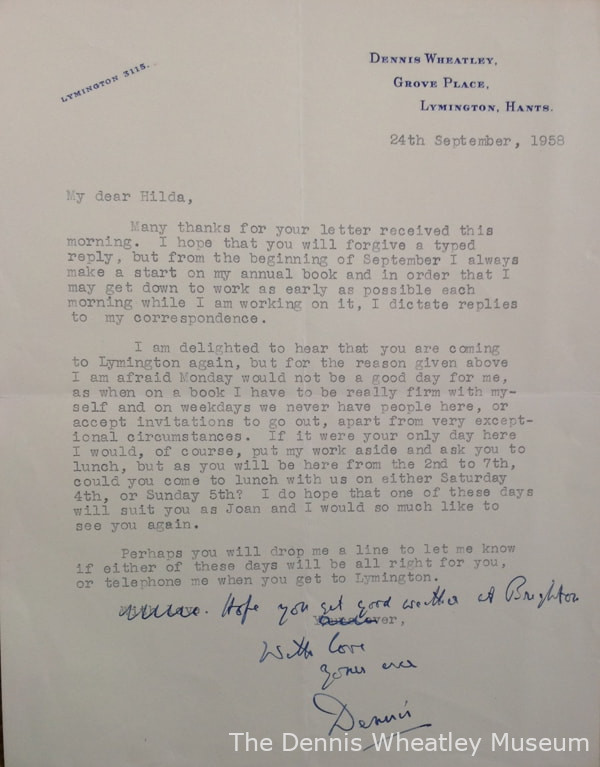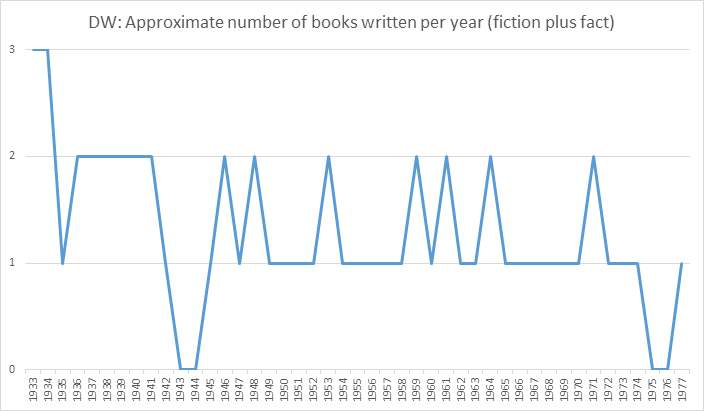
 |
Floor Plan |  |
The Dennis Wheatley 'Museum' - Dennis Wheatley's Writing Technique
DW the disciplined writer

DW would not allow even one of his oldest friends to interrupt his writing schedule
Click on the images to enlarge
If he had to, as when he was twenty, DW could write under shellfire, snatching the quiet moments to write when he could; but in general he preferred seclusion, and while some days will have been more productive than others, when he was established, he had a very organised routine as a writer.
In his earliest days as a bestseller, DW generally wrote three books per year, but after the war, this reduced to one or two books per year. DW settled down to just writing one book per year in the 1950s, and stuck to this (with the exception of writing a short second book in 1964 - Bill For The Use Of A Body - because he needed additional funds to pay the taxman) for the rest of his working life.
DW described his writing routine to journalist John Woodiwiss in the Spring of 1950 as follows:
'Unlike so many authors, Dennis Wheatley writes his books in longhand, and his table was piled high with sheets of neatly written foolscap, a portion of his latest novel. He told me that he now turns out one book a year which normally takes about seven months to complete. His method is to begin work in October and he continues writing until about the following April or May. Work begins at 9.30 until lunch and he then starts again after tea and often continues until past midnight. The summer months are devoted to gardening and the building of walls, a hobby at which he has become very adept. He is thus able to rest his brain and prepare for future literary efforts.'
DW expanded on this a few years later in his Cantor lecture:
'When I sit down to a book I endeavour to put aside everything else that is not really urgent, so that I am able to live in my story. I have found that if I can flop into bed at night still thinking about it I wake in the morning with the next scene crying out to be written. Having tried many methods, my own experience is that, in the long run, it is quickest to write in pencil and rub out as I go. I work six days a week and from ten to twelve hours a day. Even so, in a day I rarely manage to write more than two thousand words; but those two thousand need very little further correction.'
In similar vein, DW wrote in his autobiography:
'At nine-thirty my secretary arrived and I spent an hour or so dictating replies to the many letters I received. From about ten-thirty I worked on the book that I was writing. At One o'clock a short break for lunch; afterwards another hour's work until, say, half-past two. Then a nap on my sofa for, as Churchill discovered long before me, work in the afternoon has almost invariably to be done again. Four o'clock and a cup of tea was brought to me. Then work until dinner time and, after dinner, till midnight or sometimes two o'clock in the morning. I had been brought up to work on Saturdays so - unless we were staying away, travelling, or had friends staying with us - I stuck to this routine six days a week.'
Adding:
'On average we were travelling abroad about two months in every year and as I am not a quick writer I did not usually cover more than four sheets of foolscap a day; so it took me, with research, about seven months to produce a book.'
And:
'It is no good waiting to write until the spirit moves one. An author should observe regular hours of work and allow nothing to distract him from his job. It is rare to meet a successful author who finds his work easy. Best-sellers are not just gaily knocked off on a typewriter or the finished article produced by a few hours of dictation a day. Every sentence has to be gone over again and again.'
As can be seen from the above, DW was a thoroughly organised and disciplined writer.
Footnote: If DW's average book was 150,000 words long and had twenty four 6,500 word chapters (but as we will see in a later exhibit, DW's book lengths and chapter lengths were in fact extremely varied) and if DW's figure of two thousand words a day is correct (I suspect it is an over-estimate), this means that when he settled down to write a book after his initial planning and research, he would write a 6,500 word chapter in about three days, and an entire book in about seventy five. If this was the case, it would suggest that DW spent roughly half his work time preparing to write each book, and the rest in the actual writing.
| References: | DW's interview with John Woodiwiss in his 'Famous People of Hampshire' series is to be found in 'Hampshire Countryside' Vol. 2 No. 4, April/June 1950. |
| DW's Cantor Lecture of 27th April 1953 on 'The Novelist's Task', reproduced in The Journal of the Royal Society of Arts Vol CI No. 4908 of 18th September 1953. | |
| 'Drink and Ink' pp 250-3. |
| Provenance: | Private Collections |


